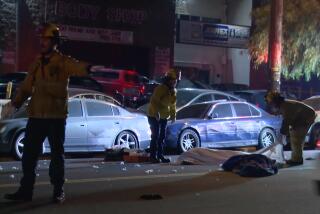Fourth of July is deadliest day on the road

If this Fourth of July holiday follows recent trends, about 134 people will die on U.S. roadways, according to a study by the Insurance Institute for Highway Safety.
That’s the average number of motorists killed in Independence Day traffic crashes from 2007 to 2011, the institute found in a recent study of data from the U.S. Transportation Department. That makes the summer holiday the deadliest day of the year on roadways.
“The main reason July 4 is the worst day is simply exposure,” said Russ Rader, a spokesman for the institute. “More people are driving more miles on summer days. You couple that with a holiday, and you have a higher likelihood of serious crashes.”
In circulating the institute’s findings, Allstate Insurance attributed the high number in part to distracted teenagers texting while driving. Teenagers accounted for 6% of crash deaths reported, “but continue to be particularly susceptible to distracted driving incidents,” according to an Allstate news release.
Drunk driving also appears more prevalent, Rader said.
“Previous research we’ve done shows a higher proportion of fatal crashes on July 4 involve alcohol compared with a typical day,” he said.
New Year’s Day, another booze-filled holiday, saw 601 deaths from 2007 to 2011, compared with a total of 670 on Fourth of July.
Common sense could help law-abiding citizens keep the roads safer this year, Rader said.
“If everyone obeyed traffic laws, there would be very few crash deaths on July 4,” he said. “The key things to do to reduce your risks – on July 4 or any day: Buckle your safety belt, slow down, obey speed limits and don’t drink and drive.”
ALSO:
Beware, Siri: Even voice texting is dangerous while driving
Do cellphone distracted driver laws go too far? Court will decide
Carmakers quibble over the obvious: Hands-free is not risk-free





